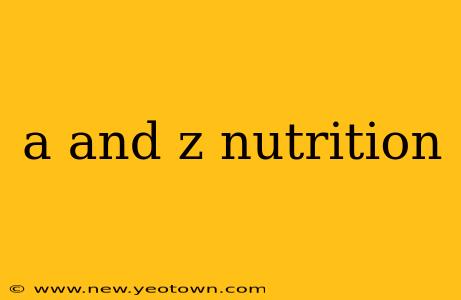Embark on a nutritional journey with us, exploring the vast landscape of vitamins, minerals, and nutrients vital for a thriving life. This isn't just another list; it's a story of how each element plays a crucial role in your overall well-being. We'll delve into the fascinating world of nutrition, unraveling the mysteries behind each essential component and how they contribute to your body's symphony of health. Think of this as your personal nutritional encyclopedia, a guide to empower you to make informed choices for a vibrant and energetic life.
Understanding the Alphabet of Nutrients: Why A to Z Matters
Our bodies are intricate machines, constantly working to maintain optimal function. To do this effectively, they require a diverse array of nutrients, each playing a unique and vital role. From the energy-boosting power of Vitamin B to the bone-strengthening calcium, understanding these building blocks is paramount to achieving your health goals. This A to Z guide will help you understand the significance of each nutrient and how to incorporate them into your daily life. It's not about strict diets or restrictive eating; it's about nourishing your body with the elements it craves to thrive.
What are the Essential Vitamins and Minerals? (And Why Do I Need Them?)
This is a question many people ask. Let's break it down. Vitamins and minerals are micronutrients – meaning our bodies need them in smaller quantities compared to macronutrients (carbohydrates, proteins, and fats). However, their importance shouldn't be underestimated. Deficiencies can lead to a range of health problems, highlighting the critical role they play in maintaining optimal health. This section will explore the essential vitamins and minerals – those our bodies can't produce themselves and must obtain through diet or supplementation. We'll cover a selection of key players, highlighting their benefits and potential deficiency symptoms.
Vitamin A: The Visionary Vitamin
Vitamin A, crucial for vision, immune function, and cell growth, is found in colorful fruits and vegetables like carrots and sweet potatoes. A deficiency can lead to night blindness and impaired immune function.
Vitamin B Complex: The Energy Powerhouse
This isn't a single vitamin but a group of eight, each playing a vital role in energy production, brain function, and nerve health. Deficiency symptoms vary depending on the specific B vitamin, but often include fatigue, weakness, and nerve damage.
Vitamin C: The Antioxidant Champion
Known for its antioxidant properties, Vitamin C protects cells from damage, boosts immunity, and aids in iron absorption. Scurvy, a historical disease marked by bleeding gums and fatigue, highlights the severity of Vitamin C deficiency.
Vitamin D: The Sunshine Vitamin
Synthesized in the skin upon sun exposure, Vitamin D is vital for calcium absorption, bone health, and immune function. Deficiency is common, especially in individuals with limited sun exposure, potentially leading to weakened bones (osteoporosis) and increased risk of infections.
Calcium: The Bone Builder
Essential for strong bones and teeth, calcium also plays a crucial role in muscle function, nerve transmission, and blood clotting. Dairy products are a good source, but leafy green vegetables and fortified foods also contribute.
Iron: The Oxygen Transporter
Iron is a key component of hemoglobin, the protein that carries oxygen throughout the body. Iron deficiency anemia, characterized by fatigue, weakness, and shortness of breath, underscores the importance of sufficient iron intake.
Zinc: The Immune System Booster
Zinc plays a critical role in immune function, wound healing, and cell growth. Deficiency can weaken the immune system, impair wound healing, and lead to hair loss.
How Can I Get All the Nutrients I Need?
The best way to obtain all the essential vitamins and minerals is through a balanced and varied diet. Focus on consuming a wide range of fruits, vegetables, whole grains, lean proteins, and healthy fats. A diet rich in colorful produce ensures a diverse intake of micronutrients.
What if I'm Concerned about Nutrient Deficiencies?
If you have concerns about potential nutrient deficiencies, consulting a registered dietitian or healthcare professional is recommended. They can assess your individual needs, identify potential deficiencies, and provide personalized recommendations. They may suggest dietary modifications or, in some cases, supplementation. Never self-diagnose or self-treat nutrient deficiencies.
Conclusion: Nourishing Your Body, Nourishing Your Life
Understanding the A to Z of nutrition empowers you to take charge of your health. This journey of exploring vitamins, minerals, and other essential nutrients isn't about restrictive diets; it's about making informed choices to fuel your body and mind for a vibrant and fulfilling life. Remember, a balanced diet and regular checkups with your healthcare provider are vital steps toward optimal well-being. Start your journey today, and discover the transformative power of proper nutrition!

